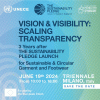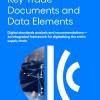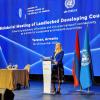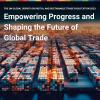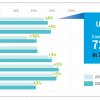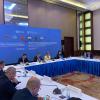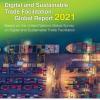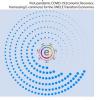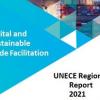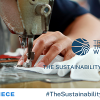Press Releases
Displaying Results 1 - 25 of 59
Three years ago, the European Union and UN Member States challenged UNECE to demonstrate that traceability and transparency were possible in the clothing and footwear sector. Today, after more than 20 project pilot projects, and 110 pledges from leading brands, manufacturers, non-governmental
To share, exchange and understand data, ships and ports need to use harmonized international standards. When ships enter and leave ports, vital information must be exchanged with various entities on land about the ship, cargoes, dangerous goods, crew, passengers and other relevant information for
Trade documents are the building blocks of global supply chains, articulating key terms of transactions or events occurring between two or more parties.
The publication today of the Key Trade Documents and Data Elements (KTDDE) report by the Digital Standards Initiative (DSI) of the
Due to their geographical location, the world’s 32 Landlocked Developing Countries (LLDCs) are facing common problems that negatively affect their economic engagement with the rest of the world. Long distances from the nearest seaports, inadequate transport and transit systems multiple border
Persisting effects of the COVID-19 pandemic, geopolitical turbulence and high inflation continue to challenge international trade. Despite these global disruptions, countries are continuing to move towards a seamless and efficient trading environment by simplifying and digitalizing formalities in
The fifth UN Global Survey on Digital and Sustainable Trade Facilitation 2023 has been launched by the five United Nations Regional Commissions and the United Nations Conference on Trade and Development (UNCTAD). The 2023 edition consists of 60 measures, including two new sets of measures on “
According to the Food and Agriculture Organization (FAO), Illegal Unreported and Unregulated (IUU) fishing represents up to 26 million tonnes of fish caught annually. It occurs on the high seas and in areas within national jurisdictions, especially affecting coastal rural populations in vulnerable
Through recommendations of its subsidiary body, the United Nations Centre for Trade Facilitation and Electronic Business (UN/CEFACT), UNECE has contributed to the elaboration of the new regulation that establishes the European Union Single Window Environment for Customs.
The new regulation
In today’s globalized economy, goods move through complex supply chains and cross borders – often numerous times, which involves multifaceted interactions among a variety of suppliers and trade actors. The COVID-19 pandemic and the war in Ukraine have brought to light the challenges of supply chain
The countries of Central Asia and Azerbaijan, which participate in the UN Special Programme for the Economies of Central Asia (SPECA), have a growing shared interest in promoting trade and transport facilitation and strengthening digital connectivity along trade corridors between Europe and East
Without scaled-up efforts to finance and sustainably manage the Critical Raw Materials needed for a rapid renewables and clean energy shift, countries of the pan-European region and North America will face huge challenges to deliver on the Paris Agreement and Sustainable Development Goals, the
“It is a responsibility to happen to be alive at this very moment, when scientists are telling us that we are facing an existential threat. Every person, every business, every government – especially those with the privilege of choice and power – needs to play a part in the transformation towards
16 May 2022, Geneva – participants from around the globe representing governments, National Trade Facilitation Bodies (NTFB) experts and private sector joined the online roundtable organized by the UN Economic Commission for Europe (UNECE) and the UN Conference for Trade and Development (UNCTAD) in
Celerity is the essence of any disaster response. Swift distribution of equipment, relief goods and services to those that need them can minimize the destruction and alleviate the suffering inflicted by a disaster, restoring populations to safety, to health and to dignity sooner. But velocity of
A seminar and a high-level roundtable focusing on “Trade Facilitation in the Digital Economy” concluded years of collaboration between UNECE and the Kyrgyz Economic University (KEU). Aimed at building the capacity of local exerts, the UNECE project titled “Strengthening the capacity of the
The United Nations Economic Commission for Europe (UNECE) and the International Federation of Freight-Forwarders Associations (FIATA) announce the official release of the electronic FIATA Multimodal Bill of Lading (eFBL) data standard.
The data standard, created on the basis of the mapping of the
UNECE and its subsidiary body, the UN Centre for Trade Facilitation and Electronic Business (UN/CEFACT) have finalized and published a set of aligned standards for the digitalization of intermodal transport data exchanges to support global supply chain cargo movements.
These standards comprise
The United Nations Economic Commission for Europe (UNECE) and the International Civil Aviation Organization (ICAO) have completed new digital air cargo technical specifications guidance that will help to accelerate the transition towards safer and more resilient supply chains, while making
Countries across the globe have made progress on digitalizing international trade formalities during the COVID-19 pandemic, but stronger efforts are needed to facilitate trade for small and medium-sized enterprises (SMEs) and other groups and sectors with special needs, according to a report
During the COVID-19 pandemic, driven by the constraints imposed by social distancing measures and restrictions on movement, businesses and consumers in the economies in transition in the UNECE region (e.g. Central Asia, Southern Caucasus, Western Balkans and Eastern Europe) – mirroring global
UNECE and FAO are implementing blockchain tracing technology in cotton supply chains in Latin America. Demand is increasing from consumers for more traceability of their products to the origin and for more transparent sustainability credentials. Yet in countries such as Peru, 99% of the cotton
The trade facilitation performance of 44 UNECE member States has improved from 72 per cent in 2019 to 76 per cent in 2021, according to the Regional Report on Digital and Sustainable Trade Facilitation 2021 released today. The report contains the results from the United Nations Global Survey on
The United Nations has released a first version of a Handbook on Provisions and Options for Trade in Times of Crisis and Pandemic. Work on the Handbook was initiated by ESCAP, UNCTAD and other UN Regional Commissions after realizing that the hundreds of regional trade agreements in place provided
Commitments to The Sustainability Pledge are gathering speed as signatories and developers of the UNECE-brokered recommendations for improved sustainability and ethical practice in the garment and footwear sector gather for a three-day event on the sidelines of Milan Fashion Week.
Textile and
Countries across the globe are continuing to move towards a seamless and efficient trading environment, within and beyond national borders, by simplifying and digitalizing formalities in international trading, helping to sustain international trade despite the disruption caused by the COVID-19


